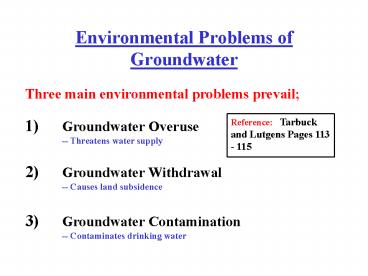Environmental Problems of Groundwater - PowerPoint PPT Presentation
1 / 10
Title:
Environmental Problems of Groundwater
Description:
For purification to occur, the aquifer must be of the correct composition. ... The best aquifer for purification is sand or sandstone. ... – PowerPoint PPT presentation
Number of Views:90
Avg rating:3.0/5.0
Title: Environmental Problems of Groundwater
1
Environmental Problems of Groundwater
Three main environmental problems prevail
1) Groundwater Overuse -- Threatens water supply
Reference Tarbuck and Lutgens Pages 113 - 115
2) Groundwater Withdrawal -- Causes land
subsidence
3) Groundwater Contamination -- Contaminates
drinking water
2
Groundwater Overuse
- Groundwater appears to be an endless renewable
resource, for it is replenished by rain and
melting snow.
- But in some regions, groundwater has been
treated as a non-renewable resource. Not having
enough time to replenish itself.
- Where this is the case the amount of water
available to recharge the aquifer is
significantly less than the amount being
withdrawn.
3
Groundwater Overuse
- In agriculture areas, irrigation practices for
extended periods of time result in groundwater
depletion. It can be said that, groundwater is
literally being mined.
- It could take tens to hundreds of years for the
groundwater to be replenished.
4
Groundwater Withdrawal
- Can lead to land subsidence (sinking).
- Water is removed (pumped) from the land faster
than it can naturally recharge.
- This effect is evident in areas where layers of
loose sediments is present.
- As water is withdrawn, the weight packs the
sediment grains tightly together and the ground
sinks.
5
Groundwater Contamination
- Groundwater contamination is a serious problem,
particularly where aquifers supply areas with
drinking water and fresh water ponds.
Types of contamination that threaten groundwater
include
1) Sewage from septic tanks and broken sewer
lines.
2) Pollutants from landfills and industrial
waste.
3) Chemicals from highway salt, pesticides and
fertilizers.
6
Contamination by Septic Tanks
- Sewage seeps from drain pipes of septic tanks.
If sediment has high porosity and is extremely
permeable, the contaminants reach the zone of
saturation and contaminate the groundwater
supply.
7
Contamination by Landfills
- As rain water percolates through the soil, it
can carry pollutants down to the water table
where it mixes with and contaminates
groundwater. - These contaminants are then carried to ponds,
rivers, wells, etc.
8
Contamination by Other Sources
- Other pollutants and chemicals that . . seep
into the ground and contaminate . groundwater
include - 1) Highway Salt
- 2) Industrial Waste (leaking tanks)
- 3) Fertilizers (lawns and farms)
- 4) Pesticides (agriculture chemicals)
9
Groundwater Purification
- For purification to occur, the aquifer must be
of the correct composition. Permeable aquifers
has large porosity and contaminated water
travels great distances without being purified.
- The best aquifer for purification is sand or
sandstone. Contaminated water can sometimes be
purified after traveling only tens of meters
through it.
10
Sample Problem
Explain how contaminated ground water can be
purified by passing through Earths materials.
Answer As ground water percolates slowly through
sediment or rock of relatively low permeability
and porosity (sand or sandstone) the contaminants
are filtered from the water. The filtering of
groundwater occurs when contaminants is trapped
in the pore spaces and on the surface of the
grains within sediment and sedimentary rock.

